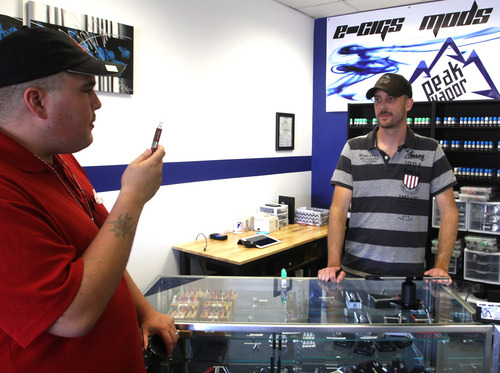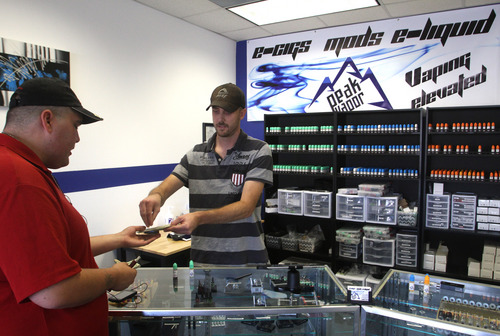This is an archived article that was published on sltrib.com in 2013, and information in the article may be outdated. It is provided only for personal research purposes and may not be reprinted.
A consortium of e-cigarette retailers announced this week that they have implemented new standards designed to limit youth access and improve product safety and quality of the nicotine liquids they manufacture.
Meanwhile, state health officials announced startling new preliminary findings that show the number of eighth, 10th and 12th grade students who have experimented with e-cigarettes in the past 90 days has doubled in just two years — and the number of youth who have used one within the past 30 days has tripled, said Adam Bramwell, a spokesman for the Utah Department of Health's Tobacco Prevention and Control Program.
"There are more students using an e-cigarette than any other form of tobacco," he said. "It's becoming the No. 1 nicotine delivery of choice."
He said one of his division's major concerns is the youth getting access to e-cigarettes as local smoke shops are traditionally more likely to sell to minors than convenience stores and big box stores. Also, it's very easy to order them online.
Aaron Frazier, director of Utah Vapers, agreed with the state that many youth are likely obtaining the e-cigarettes from smokeshops, but said his organization, which doesn't work with smokeshops, is committed to keep an adult product out of the hands of children.
His group advocates for the use of personal vaporizers — best known as e-cigarettes — is comprised of shops that deal in only e-cigarettes or accessories, he said, and has been working on the new standards for nearly a year.
About 25 retailers and manufacturers of e-cigarettes exist in Utah, and Frazier said 22 have adopted the new standards.
The biggest change for Utah Vapers will come in the manufacturing of the liquid nicotine product that goes into an e-cigarette.
About 30 to 40 percent of Utah e-cigarette companies manufacture their own liquids, Frazier said, and have agreed to uphold the same level of manufacturing standards as the food industry. That means stainless steel appliances along with employees wearing gloves, masks and hair and eye coverings. It also means no caffeine or other additives or supplements will be added. Frazier said those additives aren't typically a problem in Utah, but they have become an issue in other states.
"We want to make sure that the suppliers here understand what these requirements are and they follow them to the letter," Frazier said.
He said the e-cigarette industry is a financially lucrative business enterprise across the nation with businesses popping up all over, often with little oversight.
"We're doing the best we can to make sure those people don't operate in Utah," he said.
Bramwell said one issue with e-cigarettes is the health impact has not been tested or analyzed by the FDA like with traditional cigarettes or Nicorette gum. And when it comes to mixing the liquid substance, in inexperienced hands, someone could accidentally turn nicotine into a poisonous or fatal chemical.
Bramwell said time will tell if the new regulations will have any impact, but said they appear to be a "step in the right direction."
"It's ultimately a self-regulation, but I don't know how much weight it's going to have," he said.
Utah law requires that people must be at least 19 to purchase or possess an e-cigarette, and Frazier said the 25-or-so businesses he represents are committed to enforcing that law.
Twitter: @sltribjanelle









